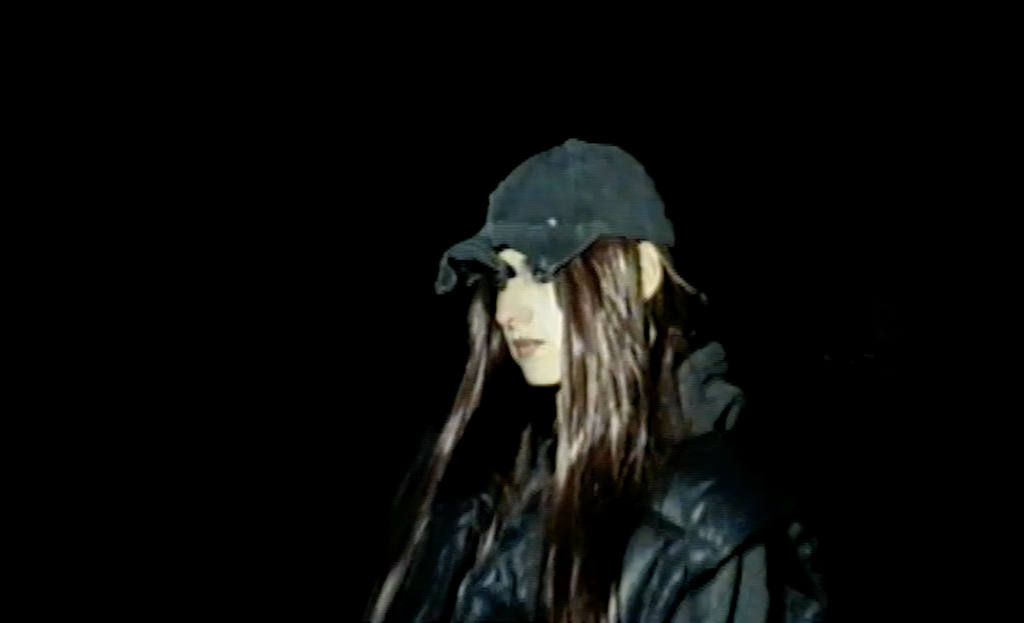Echoes of nostalgia: Sasha Smirnova on sound, memory, and migration.
Published July, 2025
by Polina Khatsenka

“We were just playing around with a VHS camera in the woods,” Sasha Smirnova says about her upcoming music video. It wasn’t planned, not in the way most productions are. There was no script, no tight schedule. Just a few friends—some from the same Eastern European background—filming what caught their eye, letting intuition lead the process. And occasionally, what was supposed to be a photo shoot turned into a fully formed video for the second single of her forthcoming album.

[evident focus – upcoming music video still]
This blending of spontaneity, memory, and emotional layering is somewhat of a method for Sasha, a Belarusian audiovisual artist now based between Berlin and Barcelona. Her work sits at a delicate crossroads: between migration and home, between past and present, between visual and sonic language.
“It’s a vibe-based piece,” she says of the upcoming video. And behind that vibe is a shared sense of Eastern European nostalgia that runs deep in both her creative collaborations and her artistic identity. However, the music video for her single “Of My Mind” bears an opposite approach of a planned shoot with a dedicated crew – all necessary for catching the haunting of past but prominently present childhood experience: “We all sort of know what a dacha feels like,” she says with a laugh, referring to the iconic summer cottages of the post-Soviet landscape. “There’s even a ‘dacha fashion’—whatever old clothes survived in your house eventually ended up there.”

[dacha – home archive]
But there’s nothing purely sentimental in her references. Sasha’s nostalgia is multifaceted. She describes it as something triggered by place, smell, or sound—like hearing someone cooking dinner on a summer evening, bringing her back to the quiet of her grandmother’s home. But it’s also unsettling: “It’s painful sometimes to think about things you can’t return to—places, times, people. Even if nothing bad happened, unpacking these memories can be heavy.”
Sasha left Minsk in 2012. What started as a voluntary departure for studies and work turned, over the years, into a more complex form of migration—entangled in bureaucratic precarity and emotional dislocation. She speaks about the loneliness of Sundays abroad, the constant balancing act between presence and longing, and the subtle forms of exile that emerge even without political force. “In Spain, I had local friends. I spoke the language. But I was always still from the outside. It’s a very specific kind of distance.”
That distance becomes texture in her music. While lyrics are rare in her work, her compositions carry a sense of blurred memory—improvised sonic layers that drift between melancholy and warmth. Sound, for Sasha, functions like an archive. She’s been thinking about creating a sound library of Belarusian memory: supermarket jingles, street noises, even memes. “So many things are already being erased. Sound can be a form of resistance—of preservation.”
Her recent release, “Of My Mind,” carries traces of this approach. A friend described the vocal layering as reminiscent of spring rituals and Belarusian traditional singing—something Sasha hadn’t consciously intended. But it made sense. “I sang in choirs as a kid, and my cousin is a professional folk singer. That music is in me, somehow. Especially the sadness—minor scales, heavy lyrics. You sing it, and something releases.”
[Sasha Smirnova – Of My Mind (Official Music Video)]
Before fully diving into music, Sasha trained as an architect and urbanist. She studied in Barcelona, spent 6 months at Moscow’s Strelka Institute during its speculative design era, and even considered a PhD. But the pull toward something less rigid, less lonely, eventually won. She taught herself visual production, worked in event collectives, and began experimenting with sound. Classical piano training helped. So did a few electronic music courses that gave her, in her words, “a structure to build on without feeling like an imposter.”
Now, she’s focused. Her studio in Berlin—a shared space that finally allows her to work without worrying about volume or neighbors—is the ground where her new album has taken shape. “I used to rent studio hours, and that pressure made me super productive,” she says. “But it’s good to be able to simply chill on the couch and let things come, too.”
The upcoming album, set for release this summer, marks a more cohesive moment in her artistic development. “My first EP felt random, as if I was still searching. This record sounds like me.” It will be accompanied by visuals, including the aforementioned video—a strange, textured work drawing inspiration from Jonathan Glazer’s Under the Skin and the shared childhood memories of its collaborators. There’s a figure following the protagonist, trying to absorb her memories. A haunting metaphor for nostalgia itself.

[Of My Mind – music video still]
“Sometimes I think I’m nostalgic for times I didn’t even live through,” Sasha says. It’s a feeling shared by many Eastern European artists who grew up surrounded by the aesthetic leftovers of the Soviet 80s and 90s. It’s less about historical accuracy, more about emotional inheritance”.
Despite all the poetic density of her work, Sasha keeps a pragmatic outlook on the music world: “There’s no American dream here,” she says. “Everyone I know who’s made it just worked really hard for years. You keep going.”
For now, she plans to take a breath after the release—perhaps spend time on ambient pieces or begin sketching ideas involving traditional music archives. But her central thread will remain: memory, in all its fragmented and sonic forms.
“Music lets you express something without having to explain it,” she says. “And that’s exactly how memories work.”
Text: Polina Khatsenka
Lead image: SashaSmirnova by Gil Vorujeira / Uliana Velgosh
This article is brought to you as part of the EM GUIDE project – an initiative dedicated to empowering independent music magazines and strengthen the underground music scene in Europe. Read more about the project at emgui.de.
Funded by the European Union. Views and opinions expressed are however those of the author(s) only and do not necessarily reflect those of the European Union or the European Education and Culture Executive Agency (EACEA). Neither the European Union nor EACEA can be held responsible for them.